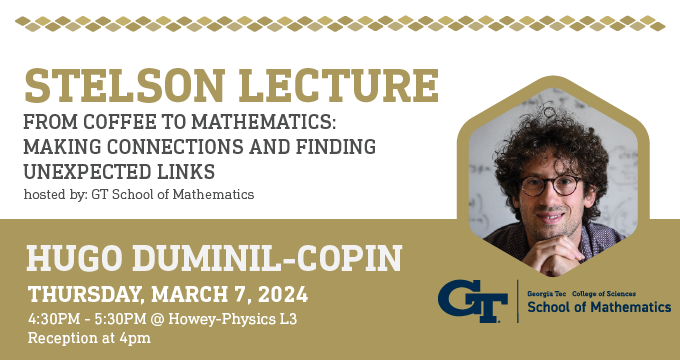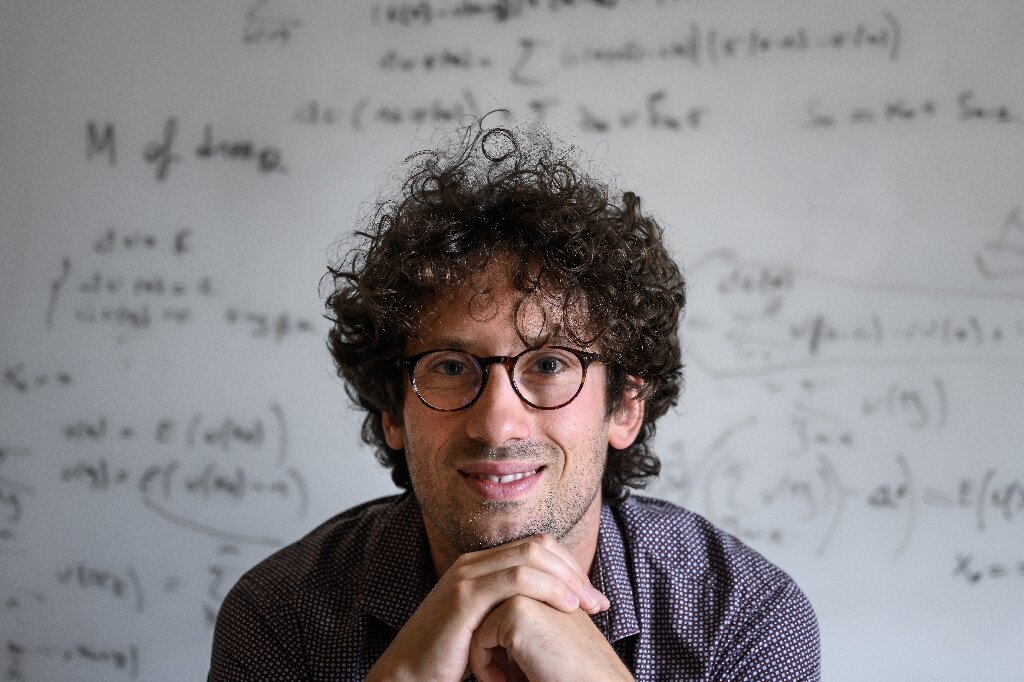- You are here:
- Home
December 3, 2023
Prof. Hugo Duminil-Copin will give two talks for the Stelson Lecture series, a public lecture on March 7th at 4:30pm-5:30pm in Howey-Physics L3, and a School of Mathematics Colloquium on March 8th at 11am in Skiles 006. Refreshments at both events will be provided. The public lecture is designed to be accessible to a wide audience.
Public lecture, March 7th at 4:30pm in Howey-Physics L3
From Coffee to Mathematics: Making Connections and Finding Unexpected Links
The game of HEX has deep mathematical underpinnings despite its simple rules. What could this game possibly have to do with coffee?! And how does that connection, once identified, lead to consideration of ferromagnetism and even to the melting polar ice caps? Join Hugo Duminil-Copin, Professor of Mathematics at IHES and the University of Geneva, for an exploration of the way in which mathematical thinking can help us make some truly surprising connections.
Colloquium, March 8th at 11am in Skiles 006
Critical phenomena through the lens of the Ising model
The Ising model is one of the most classical lattice models of statistical physics undergoing a phase transition. Initially imagined as a model for ferromagnetism, it revealed itself as a very rich mathematical object and a powerful theoretical tool to understand cooperative phenomena. Over one hundred years of its history, a profound understanding of its critical phase has been obtained. While integrability and mean-field behavior led to extraordinary breakthroughs in the two-dimensional and high-dimensional cases respectively, the model in three and four dimensions remained mysterious for years. In this talk, we will present recent progress in these dimensions based on a probabilistic interpretation of the Ising model relating it to percolation models.
About the Speaker
Professor Duminil-Copin is a French mathematician specializing in probability theory, who studies the border between mathematics and physics and analyzes models of fluids flowing through a porous medium, such as water coursing through coffee grounds. Such models, which involve the formation of connected clusters in random networks, can also represent the spread of a disease, the circulation of a rumor, or the advance of a forest fire.
Prof. Duminil-Copin has diverse interests in a range of activities which also characterizes his work, and has sampled tools from various fields in an ongoing effort to transform mathematicians’ understanding of phase transitions. For that work, Duminil-Copin was awarded the Fields Medal in 2022 for "solving longstanding problems in the probabilistic theory of phase transitions in statistical physics, especially in dimensions three and four".
About the Stelson Lecture Series
Thomas Stelson was a distinguished Civil Engineer who served as the Dean of Georgia Tech's College of Engineering from 1971 to 1974, as Vice President for Research from 1974 to 1988, and as Executive Vice President from 1988 to 1990.
During the 70's and 80's, he oversaw a vast expansion in Tech's research expenditures during an era when Tech went from being primarily teaching-oriented university to a major research institution.
Thomas Stelson helped the School of Mathematics create the Center for Dynamical Systems and Nonlinear Studies, and he endowed the School's Stelson lectures in 1988 in honor of his father, Hugh Stelson, who was a mathematician. Hugh Stelson was born in 1903 and earned his doctorate from the University of Iowa in 1930. From 1925 to 1930, Hugh taught mathematics at several universities in Iowa, West Virginia, and Pennsylvania, and then he went on to teach at Kent State University (1930-1947) and Michigan State University (1947-1970). During that time Hugh worked on problems related to interest rates, annuities, and numerical analysis. Hugh Stelson was married to Ada May Woolley on June 4, 1925, and he was the father of Paul, Thomas, Lois, and Glenda Stelson.
Contact: Please contact Prof. Christian Houdré (houdre@math.gatech.edu) for questions in connection to the visit.
Previous Stelson Lectures
Nonlinear Waves, Spectra, and Dynamics in Infinite Dimensions
Schlag, Wilhelm (Georgia Institute of Technology, 2023-03-10)
Waves are ubiquitous in nature. Some wave phenomena are conspicuous, most notably in elastic objects, and in bodies of water. In electro-dynamics, quantum mechanics, and gravity, waves play a fundamental role but are much more difficult to find...
Reunited: An Art Historical and Digital Adventure
Daubechies, Ingrid (Georgia Institute of Technology, 2022-04-09)
Combining the mathematics of digital image processing with the history, craftsmanship, and science of art conservation, my research team at Duke University, Bass Connections Image Processing Algorithms for ...
Cryptography: From Ancient Times to a Post-Quantum Age
Pipher, Jill C. (Georgia Institute of Technology, 2018-03-01)
How is it possible to send encrypted information across an insecure channel (like the internet) so that only the intended recipient can decode it, without sharing the secret key in advance? In 1976, well before this ...
The Complexity of Random Functions of Many Variables
Arous, Gérard Ben (Georgia Institute of Technology, 2016-08-31)
A function of many variables, when chosen at random, is typically very complex. It has an exponentially large number of local minima or maxima, or critical points. It defines a very complex landscape, the topology of its ...
How Quantum Theory and Statistical Mechanics Gave a Polynomial of Knots
Jones, Vaughan (Georgia Institute of Technology, 2014-09-25)
We will see how a result in von Neumann algebras (a theory developed by von Neumann to give the mathematical framework for quantum physics) gave rise, rather serendipitously, to an elementary but very useful invariant in ...
Riemann, Boltzmann and Kantorovich Go to a Party
Villani, Cedric (Georgia Institute of Technology, 2013-04-19)
This talk is the story of an encounter of three distinct fields: non-Euclidean geometry, gas dynamics and economics. Some of the most fundamental mathematical tools behind these theories appear to have a close connection, ...
Role of Mathematics Across Science and Beyond
Glimm, James (Georgia Institute of Technology, 2010-11-22)
The changing status of knowledge from descriptive to analytic, from empirical to theoretical and from intuitive to mathematical has to be one of the most striking adventures of the human spirit. The changes often occur ...
Multiscale Modeling and Simulation: The Interplay Beween Mathematics and Engineering Applications
Hou, Thomas Y. (Georgia Institute of Technology, 2009-10-26)
Many problems of fundamental and practical importance contain multiple scale solutions. Composite and nano materials, flow and transport in heterogeneous porous media, and turbulent flow are examples of this type. Direct ...


